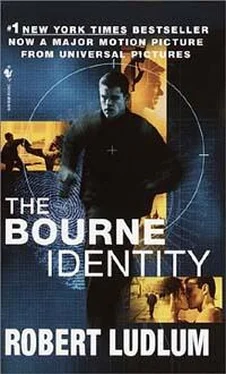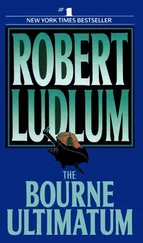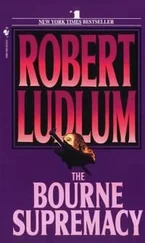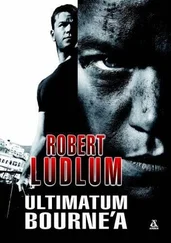“I’m worried, Jason. It’s tearing him apart. He nearly broke down on the phone. What happens when he looks at her? What must he be feeling, thinking?”
“He’ll handle it,” said Bourne, watching the traffic on the Champs-Elysées from inside the glass telephone booth, wishing he felt more confident about André Villiers. “If he doesn’t, I’ve killed him. I don’t want it on my head, but that’s what I’ll have done. I should have shut my goddamn mouth and taken her myself.”
“You couldn’t have done that. You saw d’Anjou on the steps; you couldn’t have gone inside.”
“I could have thought of something. As we’ve agreed, I’m resourceful—more than I like to think about.”
“But you are doing something! You’re creating panic, forcing those who carry out Carlos’ orders to show themselves. Someone’s got to stop the panic, and even you said you didn’t think Jacqueline Lavier was high enough. Jason, you’ll see someone and you’ll know. You’ll get him! You will!”
“I hope so; Christ, I hope so! I know exactly what I’m doing, but every now and then …” Bourne stopped. He hated saying it, but he had to—he had to say it to her. “I get confused. It’s as if I’m split down the middle, one part of me saying ‘Save yourself,’ the other part … God help me … telling me to ‘Get Carlos.’”
“It’s what you’ve been doing from the beginning, isn’t it?” said Marie softly.
“I don’t care about Carlos!” shouted Jason, wiping away the sweat that had broken out on his hairline, aware, too, that he was cold. “It’s driving me crazy,” he added, not sure whether he had said the words out loud or to himself.
“Darling, come back.”
“What?” Bourne looked at the telephone, again not sure whether he had heard spoken words, or whether he had wanted to hear them, and so they were there. It was happening again. Things were and they were not. The sky was dark outside, outside a telephone booth on the Champs-Elysées. It had once been bright, so bright, so blinding. And hot, not cold. With screeching birds and screaming streaks of metal …
“Jason!”
“What?”
“Come back. Darling, please come back.”
“Why?”
“You’re tired. You need rest.”
“I have to reach Trignon. Pierre Trignon. He’s the bookkeeper.”
“Do it tomorrow. It can wait until tomorrow.”
“No. Tomorrow’s for the captains.” What was he saying? Captains. Troops. Figures colliding in panic. But it was the only way, the only way. The chameleon was a … provocateur.
“Listen to me,” said Marie, her voice insistent. “Something’s happening to you. It’s happened before; we both know that, my darling. And when it does, you have got to stop, we know that, too. Come back to the hotel. Please.”
Bourne closed his eyes, the sweat was drying and the sounds of the traffic outside the booth replaced the screeching in his ears. He could see the stars in the cold night sky, no more blinding sunlight, no more unbearable heat. It had passed, whatever it was.
“I’m all right. Really, I’m okay now. A couple of bad moments, that’s all.”
“Jason?” Marie spoke slowly, forcing him to listen. “What caused them?”
“I don’t know.”
“You just saw the Brielle woman. Did she say something to you? Something that made you think of something else?”
“I’m not sure. I was too busy figuring out what to say myself.”
“Think, darling!”
Bourne closed his eyes, trying to remember. Had there been something? Something spoken casually or so rapidly that it was lost at the moment? “She called me a provocateur,” said Jason, not understanding why the word came back to him. “But then, that’s what I am, aren’t I? That’s what I’m doing.”
“Yes,” agreed Marie.
“I’ve got to get going,” continued Bourne. “Trignon’s place is only a couple of blocks from here. I want to reach him before ten.”
“Be careful.” Marie spoke as if her thoughts were elsewhere.
“I will. I love you.”
“I believe in you,” said Marie St. Jacques.
The street was quiet, the block an odd mixture of shops and flats indigenous to the center of Paris, bustling with activity during the day, deserted at night.
Jason reached the small apartment house listed in the telephone directory as Pierre Trignon’s residence. He climbed the steps and walked into the neat, dimly lit foyer. A row of brass mailboxes was on the right, each one above a small spoked circle through which a caller raised his voice loudly enough to identify himself. Jason ran his finger along the printed names below the slots: M. PIERRE TRIGNON —42. He pushed the tiny black button twice; ten seconds later there was a crackling of static.
“Oui?”
“Monsieur Trignon, s’il vous plaît?”
“Ici.”
“Télégramme, monsieur. Je ne peux pas quitter ma bicyclette.”
“Télégramme? Pour moi?”
Pierre Trignon was not a man who often received telegrams; it was in his astonished tone. The rest of his words were barely distinguishable, but a female voice in the background was in shock, equating a telegram with all manner of horrendous disasters.
Bourne waited outside the frosted glass door that led to the apartment house interior. In seconds he heard the rapid clatter of footsteps growing louder as someone—obviously Trignon—came rushing down the staircase. The door swung open, concealing Jason; a balding, heavy-set man, unnecessary suspenders creasing the flesh beneath a bulging white shirt, walked to the row of mailboxes, stopping at number 42.
“Monsieur Trignon?”
The heavy-set man spun around, his cherubic face set in an expression of helplessness. “A telegram! I have a telegram!” he cried. “Did you bring me a telegram?”
“I apologize for the ruse, Trignon, but it was for your own benefit. I didn’t think you wanted to be questioned in front of your wife and family.”
“Questioned?” exclaimed the bookkeeper, his thick, protruding lips curled, his eyes frightened.
“Me? What about? What is this? Why are you here at my home? I’m a law-abiding citizen!”
“You work in Saint-Honoré? For a firm called Les Classiques?”
“I do. Who are you?”
“If you prefer, we can go down to my office,” said Bourne.
“Who are you?”
“I’m a special investigator for the Bureau of Taxation and Records, Division of Fraud and Conspiracy. Come along—my official car is outside.”
“Outside? Come along? I have no jacket, no coat! My wife. She’s upstairs expecting me to bring back a telegram. A telegram!”
“You can send her one if you like. Come along now. I’ve been at this all day and I want to get it over with.”
“Please, monsieur,” protested Trignon. “I do not insist on going anywhere! You said you had questions. Ask your questions and let me go back upstairs. I have no wish to go to your office.”
“It might take a few minutes,” said Jason.
“I’ll ring through to my wife and tell her it’s a mistake. The telegram’s for old Gravet; he lives here on the first floor and can barely read. She will understand.” Madame Trignon did not understand, but her shrill objections were stilled by a shriller Monsieur Trignon. “There, you see,” said the bookkeeper, coming away from the mailslot, the strings of hair on his bald scalp matted with sweat. “There’s no reason to go anywhere. What’s a few minutes of a man’s life? The television shows will be repeated in a month or two. Now, what in God’s name is this, monsieur? My books are immaculate, totally immaculate! Of course I cannot be responsible for the accountant’s work. That’s a separate firm; he’s a separate firm. Frankly, I’ve never liked him; he swears a great deal, if you know what I mean. But then, who am I to say?’ Trignon’s hands were held out palms up, his face pinched in an obsequious smile.
Читать дальше












